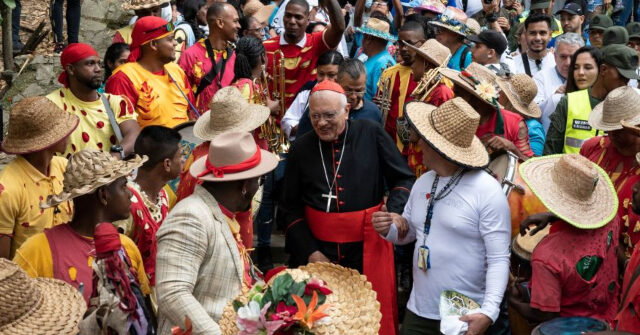Runrunes reported that the study, titled “Religious Sociography: The Religiosity of Venezuelans,” was a joint collaboration between the local religious organization Gumilla Foundation and polling firm Delphos. Venezuela is an overwhelmingly Christian nation with roughly 90 percent of the population practicing either Catholicism or other forms of Christianity.
The study found that 63 percent of respondents identify themselves as Catholic and an additional 16 percent identify as Evangelical Christians. Another six percent said they were practitioners of other Christian denominations, while eight percent of respondents declared that they do not profess any religion; this category includes atheists and agnostics.
The study revealed that it is more common for Venezuelans to identify themselves as Catholic as they get older and that most of those who declared not to practice any religion are more often in the 25 to 34 age bracket. The study also found that 49 percent of adults expressed a desire for their children to be raised Catholic, and 30 percent preferred that their children decide their own spiritual path for themselves.
Belief in God continues to be “almost unanimous” among Venezuelans according to the study’s results, as 97 percent of all respondents expressed a belief in God. Nearly 60 percent of participants defined God as an “all-powerful being and judge of the world,” and 54 percent further described God as a “loving Father who cares for his children.”
The study found that a similar number, amounting to about 97 percent of respondents, expressed belief in Jesus Christ whom they recognized as the Son of God. Sixty-four percent of respondents asserted that they pray to Jesus, 75 percent expressed belief in the existence of Heaven, and 63 percent believe in Hell. By comparison, only 38 of respondents expressed belief in the existence of purgatory, defined by Christianity as a passing intermediate state after physical death for purifying or purging a soul.
On the subject of religious practices among Venezuela’s Catholic majority, Runrunes reported that although 72 percent of those surveyed said they pray frequently, only 40 percent said that they regularly attend Mass or read the Bible, and only 15 percent participate in Catholic sacraments such as the Eucharist or Confession. The study also found that the two main reasons for praying among Venezuelans are for health and family wellbeing, “suggesting a spirituality deeply connected to day-to-day concerns and the care of loved ones.”
Asked about the image of the Catholic Church, 48 percent expressed their support of the Church. About 34 percent referred to past sexual abuse scandals as the main criticism of the institution. On the subject of the stance of the Venezuelan Catholic Church in Venezuela’s ongoing political crisis under socialism, 47 percent answered that they consider it to have a neutral stance, 17 percent said they consider it pro-opposition, and eight percent perceive it as pro-regime. Slightly over half, 53 percent, said that they believe the Venezuelan Catholic Church could play a key role in national reconciliation.
For over two decades, the Venezuelan Catholic Church has been the target of attacks and condemnation from the ruling socialist regime since the latter rose to power in 1999, first under late socialist dictator Hugo Chávez then under his successor, Nicolás Maduro.
Throughout the 14 years that he ruled Venezuela, Hugo Chávez issued a litany of accusations against the Venezuelan Catholic Church — most notably against priests who criticized Chávez’s Marxist agenda. Chávez’s attacks against the local Catholic Church started in the year 2000 after the Venezuelan Episcopal Conference raised concerns over the possibility of fraud in that year’s general elections.
Chávez’s recurring attacks against Christianity continued throughout the years. In 2007, he condemned the Venezuelan Catholic Church for questioning a failed socialist constitutional reform referendum that Chávez ultimately implemented through other means. He also issued fierce criticism against the Venezuelan Evangelicals who criticized the reform, telling them to “go to Hell.”
Venezuelan priests’ criticism of the socialist regime was often met with the ire of Chávez, who claimed in 2006 that Jesus Christ was “the first socialist.” After he was diagnosed with an undisclosed form of cancer, Chávez and his socialist regime openly co-opted Christianity and made extensive use of Christian imagery and prayers in political rallies ahead of the 2012 presidential election.
After Chávez died in March 2013, the ruling United Socialist Party of Venezuela (PSUV) “rewrote” the Lord’s Prayer to worship Chávez, posthumously elevated to the position of “Supreme and Eternal Commander of the Bolivarian Revolution.” The rewritten, socialist version of Christianity’s most important prayer prayed to Chávez to “lead us not into the temptation of capitalism.”
The socialist regime’s attacks against the Venezuelan Catholic Church continued after Maduro succeeded Chávez in 2013. The socialist dictator and other members of his regime have issued public threats against the Venezuelan Catholic Church in response to criticism espoused by some of its members. In 2018, Maduro ordered a probe against two local bishops who denounced the socialist-caused hunger and corruption in Venezuela and branded the nation’s clergy “devils in cassocks.”
Similar to Chávez, Maduro has co-opted Christianity several times to suit his own needs. Recently, Maduro debuted the latest episode of his superhero alter ego Súper Bigote (“Super Mustache”), inviting Venezuelans to celebrate Holy Week by “building socialism” with “God’s blessing.”
Maduro has repeatedly rescheduled the start of the Christmas season in Venezuela as he pleases. In 2024, Maduro declared the start of the “Christmas” season in October, forcing public offices and cities to put up Christmas decorations months before the holiday.
Christian K. Caruzo is a Venezuelan writer and documents life under socialism. You can follow him on Twitter here.
Breitbart News
Read the full article .


